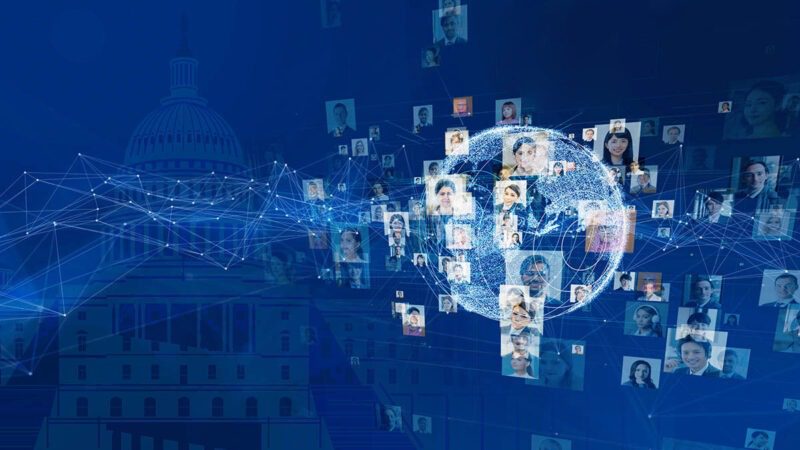Global Issues
The Molecular Revolution: How Technology Is Shaping Politics -By Josephine Jeremiah
The future of technology in politics is both promising and complex, presenting a myriad of opportunities and challenges. As advancements in technology continue to shape the world we live in, it is no surprise that politics is also being greatly influenced by these developments.

The twenty-first century has seen many revolutionary changes in technology, with each new advancement bringing far-reaching effects to our daily lives. One such advancement that is having a significant impact on the global political landscape is the advent of molecular technology. With the ability to manipulate and engineer genes and cells, researchers are now able to develop treatments for previously incurable diseases, but this technology has also created new ethical and political challenges that must be addressed, you have to know what and how molecular technology is shaping politics and the world as we know it. Whether you are interested in the future of healthcare, environmentalism, or social justice, understanding the impact of this groundbreaking technology is crucial for informed citizenship and decision-making.
The intersection of technology and politics in today’s rapidly evolving world, it’s impossible to overlook the profound impact that technology has had on every aspect of our lives. From the way we communicate to the way we consume information, technology has revolutionized our society in countless ways. One area where this intersection of technology and everyday life is particularly evident is in the realm of politics.
Gone are the days when traditional campaign strategies, such as door-to-door canvassing and town hall meetings, were the primary means of engaging with constituents. In this new era, politicians and political parties have to navigate an entirely different landscape—one that is increasingly shaped by technology.
The rise of social media platforms, for example, has transformed the way political messages are disseminated and received. The ability to reach millions of people with just a few keystrokes has given politicians a direct line of communication with their constituents and has allowed for unprecedented levels of engagement. Twitter, Facebook, and Instagram have become powerful tools in the political arsenal, with politicians using these platforms to both connect with their base and sway public opinion.
Moreover, technology has also played a significant role in shaping the way political campaigns are done. The use of data analytics and technology has revolutionized the way campaigns target voters and tailor their messages. With the ability to analyze vast amounts of data, campaigns can now identify and target specific demographics with precision, ensuring that their message resonates with the right audience.
However, this technological revolution in politics is not without its challenges. The rise of misinformation and fake news has made it increasingly difficult to discern fact from fiction. The echo chambers created by algorithms can perpetuate polarization and further divide societies. Privacy concerns and the ethical use of data are also pressing issues that need to be addressed as technology continues to reshape the political landscape.
One of the key advantages of using data in political campaigns is the ability to micro-target voters. By analyzing data on individuals’ demographics, interests, and past voting behaviors, campaigns can create highly personalized messages that resonate with different voter groups. This level of personalization not only helps to increase engagement but also enhances the effectiveness of campaign efforts.
Moreover, data analysis enables campaigns to identify patterns and trends in voter behavior. This information can be used to predict voting outcomes and allocate campaign resources more efficiently. By understanding which messages and platforms are most effective, campaigns can optimize their strategies to maximize impact.
Social media and political activism: The rise of digital grassroots movements in today’s interconnected world, social media has become a powerful catalyst for political activism. The rise of digital grassroots movements has transformed the way people engage with politics, giving individuals a platform to voice their opinions and mobilize for change like never before.
Social media platforms such as Facebook, Twitter, and Instagram have provided a virtual space for individuals to connect, share information, and organize political movements. These platforms have given rise to new forms of digital activism, enabling individuals to unite around political causes, raise awareness, and even influence policy decisions.
the impact of digital grassroots movements on politics cannot be ignored. From the Arab Spring to the Black Lives Matter movement, social media has played a pivotal role in mobilizing individuals, raising awareness, and driving meaningful political change. As technology continues to evolve, it is likely that these digital movements will only gain more prominence, shaping politics in ways we are yet to fully understand.
Technology has emerged as a powerful force in shaping political discourse in recent years. As technology continues to evolve, technology has become more sophisticated and is increasingly being used to analyze vast amounts of data, including social media posts, news articles, and public sentiment.
One of the key ways technology is impacting political discourse is through sentiment analysis. By analyzing the language and emotions expressed in online conversations, technology algorithms can gauge public opinion on various political issues. This allows political parties and campaigns to better understand the concerns and preferences of their constituents, and tailor their messaging accordingly.
Technology powered chatbots and virtual assistants are also playing a role in shaping political discourse. These intelligent systems can engage in conversations with users, providing information, answering questions, and even influencing opinions. They can be programmed to present a specific political viewpoint or to counter opposing arguments, thereby shaping the narrative surrounding political issues.
Moreover, technology is being used to detect and combat misinformation and fake news. With the proliferation of online content, it has become increasingly difficult to separate fact from fiction. Technology can analyze the credibility and trustworthiness of sources, identify patterns of misinformation, and flag potentially false or misleading information. This helps to ensure that the political discourse is based on accurate and reliable information.
From analyzing public sentiment to combating misinformation, technology is revolutionizing the way political campaigns are conducted and influencing the narratives surrounding political issues.
The interconnectedness of political systems and the reliance on digital infrastructure make them vulnerable to hacking attempts. From attacks on campaign websites and social media accounts to the infiltration of government networks, the potential consequences of a successful cyber attack on the political landscape are significant.
Addressing these cybersecurity challenges requires a multi-faceted approach. Political entities must invest in robust cybersecurity measures, including regular security audits, encryption protocols, and comprehensive employee training programs. Collaboration between government agencies, cybersecurity experts, and technology companies is also crucial to develop effective strategies and frameworks to safeguard political processes, the digital era of politics brings immense opportunities for engagement and communication, but it also presents cybersecurity challenges that require immediate attention.
However, it is important to acknowledge that technology also brings challenges and concerns. The spread of fake news and misinformation through digital channels has become a pressing issue, undermining the integrity of the political discourse and influencing public opinion. Ensuring the accuracy and reliability of information shared online is crucial to maintaining an informed electorate and preserving the democratic process, the impact of technology on voter engagement and participation in politics cannot be overstated. From increased accessibility to fostering political discussions and mobilization, technology has transformed the way people engage with political issues. As technology continues to evolve, it will undoubtedly shape the future of politics, making it imperative for policymakers, citizens, and technology developers to work together to leverage its potential for the betterment of democratic societies.
One of the primary ethical considerations is the issue of privacy. With the collection and utilization of vast amounts of data, political campaigns must ensure that the privacy of individuals is protected. The misuse or unauthorized access to personal information can lead to breaches of trust and infringe upon individuals’ rights. Therefore, it is imperative for political entities to establish robust data protection measures and adhere to strict privacy regulations.
Transparency is another crucial ethical consideration in the use of technology in politics. As digital platforms become increasingly influential in shaping public opinion, it is essential for political campaigns to be transparent about their intentions, funding sources, and the algorithms they utilize. This transparency fosters accountability and allows citizens to make informed decisions based on reliable information rather than manipulative tactics.
The future of technology in politics is both promising and complex, presenting a myriad of opportunities and challenges. As advancements in technology continue to shape the world we live in, it is no surprise that politics is also being greatly influenced by these developments.
Embracing the potential of the molecular revolution in politics, it is evident that the molecular revolution is reshaping the landscape of politics in profound ways. The integration of technology into political processes has unlocked tremendous potential for engagement, transparency, and participation.
The fascinating intersection of technology and politics, highlighting the molecular revolution that is currently taking place. We delved into how advancements in technology have transformed political landscapes, from digital campaigning and data analytics to social media influence and targeted messaging. It is evident that technology will continue to play a crucial role in shaping politics, connecting politicians with voters, and influencing public opinion. As we navigate this ever-evolving landscape, it is essential to stay informed and adapt to the changes brought about by the molecular revolution. Together, let us embrace the potential of technology to bring positive change to the political sphere.
Josephine Jeremiah
Mass communication
Abubakar Tatari Ali Polytechnic
Josephinejeremiah721@gmail.com



















